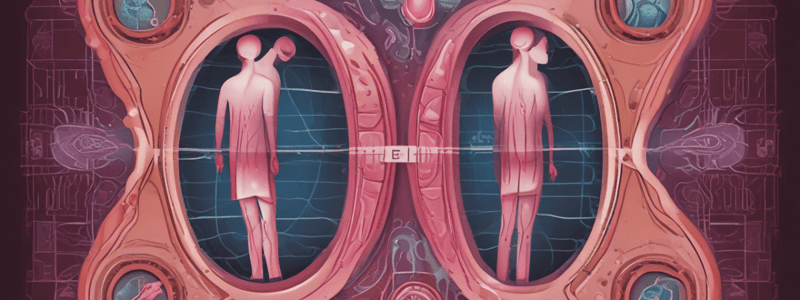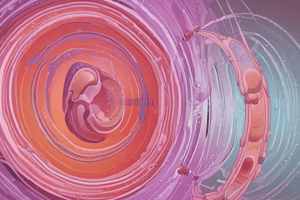Podcast
Questions and Answers
What are some lower UTIs
What are some lower UTIs
- Pyelonephritis
- Urethritis
- Prostatitis
- urethritis-inflammation of uerthra..............prostatitis..........cystitis-inflammation of bladder wall (correct)
What are the classic signs and symptoms of UTI?
What are the classic signs and symptoms of UTI?
- Urgency • Frequency • Burning • Cloudy urine • Foul-smelling urine • Hematuria • Dark Urine 5 (correct)
- Frequency, chills, atypical symptoms
- Nausea/vomiting, costovertebral tenderness, high fever
- Dark urine, foul-smelling urine, hematuria
What are UTI risk factors
What are UTI risk factors
- Stasis of Urine
- Previous UTIs
- Female Anatomic/Genetic Differences
- Stasis of Urine Contamination Instrumentation infection Faulty valves Previous UTIs Female Anatomic/Genetic Differences Aging (correct)
What are upper UTIs
What are upper UTIs
What are some specific symptoms of pyelonephritis?
What are some specific symptoms of pyelonephritis?
What is a potential consequence of untreated urosepsis?
What is a potential consequence of untreated urosepsis?
What are nursing interventions for UTIs
What are nursing interventions for UTIs
What are some urological obstructions
What are some urological obstructions
Which factor contributes to the development of urological obstructions/strictures
Which factor contributes to the development of urological obstructions/strictures
What are urethral stricture treatments
What are urethral stricture treatments
Which mineral is commonly associated with renal calculi urolithiasis
Which mineral is commonly associated with renal calculi urolithiasis
Renal calculi stuff to know
Renal calculi stuff to know
What are renal calculi signs and symtoms
What are renal calculi signs and symtoms
What are some renal calculi diagnostics
What are some renal calculi diagnostics
Which therapeutic measure is recommended for preventing the occurrence of small renal calculi?
Which therapeutic measure is recommended for preventing the occurrence of small renal calculi?
What are therapeutic measures for renal calculi
What are therapeutic measures for renal calculi
What are some therapeutic measures in renal calculi larger than 10 mm in size
What are some therapeutic measures in renal calculi larger than 10 mm in size
What is the primary focus of therapeutic measures in diabetic nephropathy?
What is the primary focus of therapeutic measures in diabetic nephropathy?
What is nephrotic syndrome
What is nephrotic syndrome
What are nephrotoxic signs and symtoms
What are nephrotoxic signs and symtoms
In the context of diabetic nephropathy, what does A1C stand for?
In the context of diabetic nephropathy, what does A1C stand for?
What are therapeutic measures in nephrotic syndrome
What are therapeutic measures in nephrotic syndrome
What is glomerulonephritis
What is glomerulonephritis
What are glomerulonephritis causes
What are glomerulonephritis causes
glomerulonephritis signs and symptoms and diagnoses
glomerulonephritis signs and symptoms and diagnoses
What is a key goal in managing acute glomerulonephritis?
What is a key goal in managing acute glomerulonephritis?
What is acute kidney injury (AKI)
What is acute kidney injury (AKI)
What are causes of acute kidney injury
What are causes of acute kidney injury
Acute kidney injury stuff
Acute kidney injury stuff
What are common nephrotoxic meds in AKI
What are common nephrotoxic meds in AKI
AKI injury phases
AKI injury phases
What are acute kidney injury therapeutic measures
What are acute kidney injury therapeutic measures
What is the main function of Continuous Renal Replacement Therapy (CRRT)?
What is the main function of Continuous Renal Replacement Therapy (CRRT)?
What is AKI prevention
What is AKI prevention
What is CKD
What is CKD
Chronic kidney disease diagnostics
Chronic kidney disease diagnostics
What are CKD signs and symptoms
What are CKD signs and symptoms
More CKD symptoms
More CKD symptoms
What is CKD diet
What is CKD diet
CKD medications u use
CKD medications u use
What is hemodualysis
What is hemodualysis
What is peritoneal dialysis
What is peritoneal dialysis
What are hemodialysis vascular acess care treatment
What are hemodialysis vascular acess care treatment
Flashcards are hidden until you start studying




